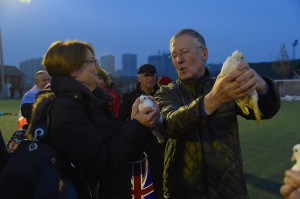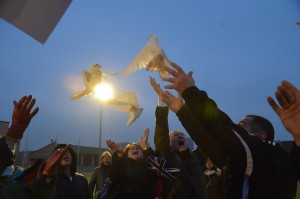9th December 2014 Yerevan, Armenia
Remembrance and reconciliation: WW1 centenary events from the UK and German Embassies
Why were the German Ambassador and I at a British-German football match on Friday afternoon, singing Christmas carols and drink ing hot soup from tin mugs? What was UN Secretary General Ban Ki Moon doing at a penalty shoot-out between British and German delegations to the UN?
ing hot soup from tin mugs? What was UN Secretary General Ban Ki Moon doing at a penalty shoot-out between British and German delegations to the UN?
For a week, in football matches across the UK and around the world, we are remembering one of the rare, heart-warming moments from WW1 (see www.FootballRemembers.com). On Christmas Day 1914, along the Western Front the guns fell silent in an unofficial truce. Soldiers star ted singing Christmas carols. A few brave soldiers climbed over the top of the trenches waving white flags. In no-man’s land, British and German soldiers exchanged greetings and presents – and in a few places started playing football, with a tin of beef if they didn’t have a proper ball.
ted singing Christmas carols. A few brave soldiers climbed over the top of the trenches waving white flags. In no-man’s land, British and German soldiers exchanged greetings and presents – and in a few places started playing football, with a tin of beef if they didn’t have a proper ball.
In our commemoration of WW1’s centenary this year, we wanted to honour the memory of those who died; recognise the failure of diplomacy and leadership which led to war; and remember that war swiftly takes on a deadly momentum which consumes the innocent and makes the unthinkable possible. These, unfortunately, are all lessons which we still need to remember in Europe today.
But we also wanted to celebrate those moments where ‘enemies’ were able to forget politics, and nationality, and language, and fear – and simply relate to each other as human beings, far from home, cold and wet, wanting to feel the warmth of sharing something (a joke, a game, a chocolate) with someone else. This is the wonderful human message of the Christmas Truce.

For the WW1 centenary is about both remembrance and reconciliation. After two devastating world wars and the loss of tens of millions of lives, Britain, Germany, France and other European powers have been able – finally – to face up to our past together, learn painful lessons, and develop a political culture across Europe which has attempted to put humanity – the fair and respectful treatment of each individual – at its heart.
This political project of remembrance and reconciliation has brought the people of Europe unimagined prosperity and political freedom. But it has taken a long time – with a long way to go. For some European countries, like Armenia, the trauma and horror of World War 1 and its ongoing impacts have still not been touched by the transformative power of reconciliation. Borders remain closed and militarised, and indescribably painful history continues to bleed into the present. Sometimes it is hard to believe change is possible. 

Together with the German Ambassador, through our joint WW1 commemorative events over the past six weeks, we have tried to say: don’t give up. Reconciliation – even between those who seemed at one time the most bitter enemies – is possible. Together we spoke to schoolchildren from British and German specialist schools in Gyumri about the lessons of WW1; attended each other’s Remembrance Day events; laid flowers at the graves of German and Romanian soldiers; enjoyed a ‘piano battle’ between rival pianists; and finally had our Embassy teams play football against each other.
flowers at the graves of German and Romanian soldiers; enjoyed a ‘piano battle’ between rival pianists; and finally had our Embassy teams play football against each other.

By the way, our German colleagues beat us 6-1. Without the heroic efforts in goal of my Embassy colleague Edik, it would have been far, far worse…..But never mind – let them win this time. Over the long run, taking part, playing by the rules and having a fair chance to do your best is what makes the game ‘win-win’ for everyone.